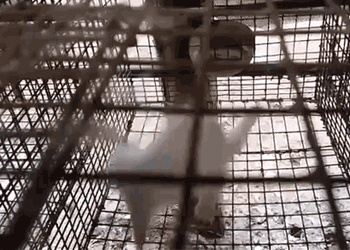COVID-19 Cases in Minks Prompt Call to Ban Netherlands Fur Farms Now
Following reports that minks have tested positive for COVID-19 on Dutch fur farms, PETA Netherlands sent a letter urging the country’s agriculture minister to bring forward the deadline for phasing out mink farming, which is currently set for 2024.
These farms are hell for minks and a threat to human health. At least two workers on Dutch fur farms have tested positive for the coronavirus after contracting it from the animals. Allowing mink farms to maintain business as usual – in the face of a global crisis stemming from animal exploitation – would put more workers at risk, as well as harming the minks themselves.
 Jo-Anne McArthur / Djurrattsalliansen
Jo-Anne McArthur / Djurrattsalliansen
Fur Farms Are Breeding Grounds for Disease
Filthy fur farms packed with sick, stressed, and injured minks are breeding grounds for disease. SARS and the novel coronavirus first infected humans who came into close contact with captive wildlife at live-animal markets – which represent a similar public health risk to that posed by fur farms.
The US Centers for Disease Control and Prevention warns that approximately 75% of recently emerging infectious diseases affecting humans originated in other animals.
Wet Market:

Mink Fur Farm:
As in the case of live-animal meat markets, on fur farms, minks and other animals killed for their skin are confined to cramped wire cages adjacent to one another, making it very easy for infectious diseases to spread through the exchange of urine, excrement, pus, and blood. Animals with infections, sores, and festering, open wounds caused by the wire flooring they stand on are a common sight. Fur farmers and handlers are among those who most commonly suffer from the zoonotic bacterial disease tularaemia.
In the face of a global crisis stemming from the wildlife trade, the Netherlands shouldn’t wait another four years to shut down its last remaining fur farms – it must take action now.
Fur Farming Is Cruel
On fur farms, minks are imprisoned in barren cages for their entire lives. Unable to engage in natural behaviour, they often go mad from the confinement, and some even self-cannibalise, chewing on their own limbs or tails as a result of the constant psychological and physical torment. They’re killed in gruesome ways, such as by poisoning, gassing, drowning, or being skinned alive.

What You Can Do
Because of the cruelty and environmental damage inherent in fur production, PETA and other animal protection groups are calling on the UK government to ban fur sales and imports. The proposal received cross-party support when it was debated in Parliament, and an early day motion on the matter has now been tabled. Please ask your MP to support a UK ban on fur imports and sales.



